A father who comes home with a gift to find his son in mortuary
Two decades, two administrations— victims of April 10 and 11, 2000 student protest ask one question: Will there be justice?
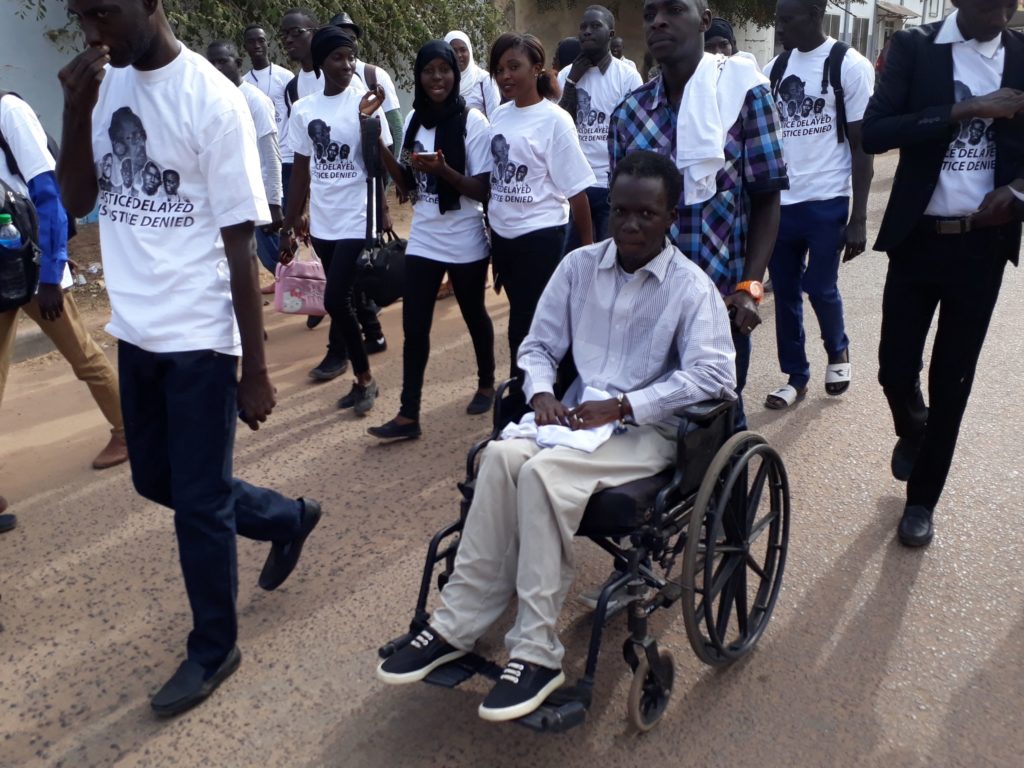
By Mustapha K Darboe
On April 9, 2000, a break from the serenity Gambia enjoyed after the 1981 botched coup was couple of hours away. But the unsuspecting Bojang family, natives of Jamburr who were resident in Tallinding, had no idea the coming hours would change their lives forever.
Abdoulie Bojang, a private security contractor, prepared for a business trip to Basse. His wife who longed to visit the provincial capital of Upper River Region proposed to go with him. As they both prepared to leave, their first son Lamin Bojang requested his father buy him a silver bangle and inscribe his name in it.
That would be their final time talking. Abdoulie bought the silver bangle as promised with Lamin’s name on it only that by the time he arrived home on April 10, Lamin has already been killed. His crime was demanding for justice for a student who was allegedly killed by security forces.
“One Dr Ceesay broke the news to me that my son had died… He was shot by security forces in his head,” says Bojang. Lamin has not had the opportunity to wear his bangle. It was in his father’s bag.
On April 11, Bojang had the opportunity to see his son’s remains. He recalled his head was in a nylon bag. But Bojang had to put the silver on his hand as he visited him at the mortuary and took a picture of it.
“The police have attempted to stop me from taking picture of the bangle but I was ready to make a mess of the place,” says Bojang. Until 2005, Abdoulie’s most precious memory of his son was his only picture he has and the silver bangle he lost to a thief in 2005.
“If I did not leave Kombo, perhaps I could have saved Lamin,” Bojang says. For a couple of minutes Bojang sat staring, appearing lost in his thoughts. “Anyway,” says Bojang after a brief pause. Sitting on a swing chair in his modest office at the Serrekunda market, he surfed through Lamin’s school papers, condolence letters from Yahya Jammeh, among others. He cynically chuckled and looked away, appearing visibly emotional.
Lamin was a commerce student at Nusrat Senior Secondary School at the time of his death. He was in grade 11, age 18. Though he was doing commerce, Lamin wanted to be a pilot, his father tells Kerr Fatou.
“He was a very intelligent and hardworking student,” says Bojang. That dream was to be ended with a bullet to the skull.
“I blame the security forces for the death of my child… It was the way they handled the situation… The police were supposed to protect them,” he says. Bojang was himself a former policeman from 1977 to 1983.
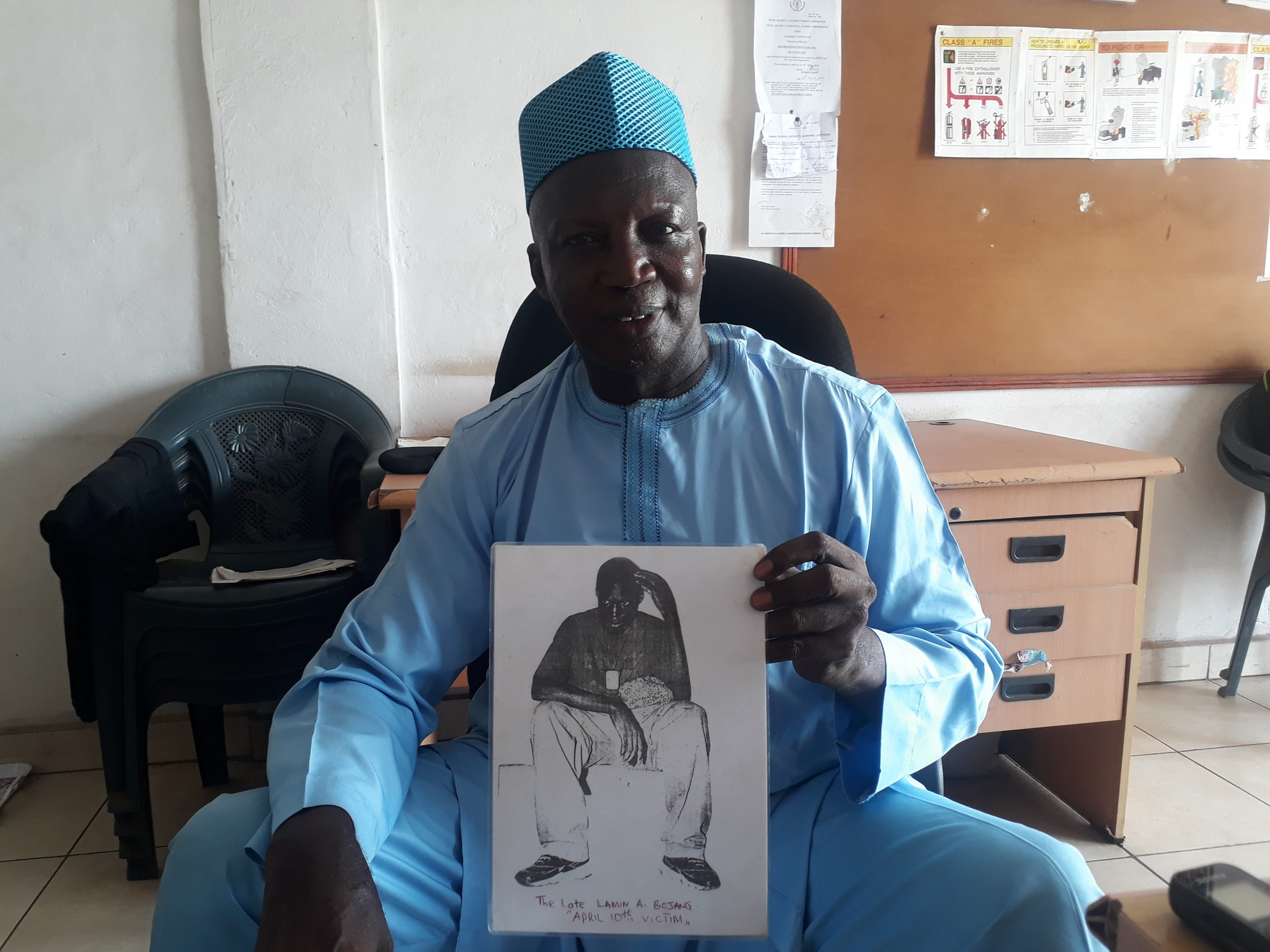
Trigger of student protest
April 2000 student protest was precipitated by two major events. The students under the direction of the national student union called Gamsu was demanding justice for Ebrima Barry and Binta Manneh, all victims of security forces.
In 2000, Binta was 15. An athlete, she travelled from her native Brikama Ba village, about 300 kilometers from Banjul, to represent her school in the national inter-school athletics competition as a sprinter.
Binta and her team went to the Independence Stadium in Bakau, the venue where the competition was being held. At around 8 p.m. Binta, a complete stranger in that environment, left the Stadium and went out to buy biscuits.
“I found two security officials outside. One of them held my hand and when I tried to free my hand from him, he told me “don’t you know I am a security officer”… They took me to a dark corner… The other one ran away. He raised my skirt up and tore off my underwear… He placed his elbow on my chest and forcefully slept with me,” says Binta before the Truth Commission on August 20. The Truth, Reconciliation and Reparation Commission has been established to investigate the human rights violations of the former President Yahya Jammeh.
“I was at the hospital for a week. I was also bleeding for 4 days… I suffered anxiety later because of trauma…”
Binta was hospitalized at the Edward Francis Small Teaching Hospital in Banjul. Betrayed by the system that is supposed to protect her, Binta’s life changed forever.
“I went back to school but the students talked about it (rape) everywhere I go. I decided to leave school. I was in grade 7…,” says Binta.
Binta said she was later told that the person who raped her was a member of the paramilitary section of the police. And it was the same police who took over the investigation. “I was going to meet the investigators in Banjul with my aunt but they later told me that I was lying…,” says Binta.
She never got the chance to say her truth and everyone doubted her. And as consequence, Binta left school and married off by his parent at that teenage age. “I was ashamed of myself,” she says. “You should not be,” replies the Commission chairman Lamin Sise. “The man who forced himself on you should be the one to be ashamed of himself.”
Like the killing of Ebrima Barry, the only semblance of justice Binta got was the opportunity to tell her story to the world before the Truth Commission.
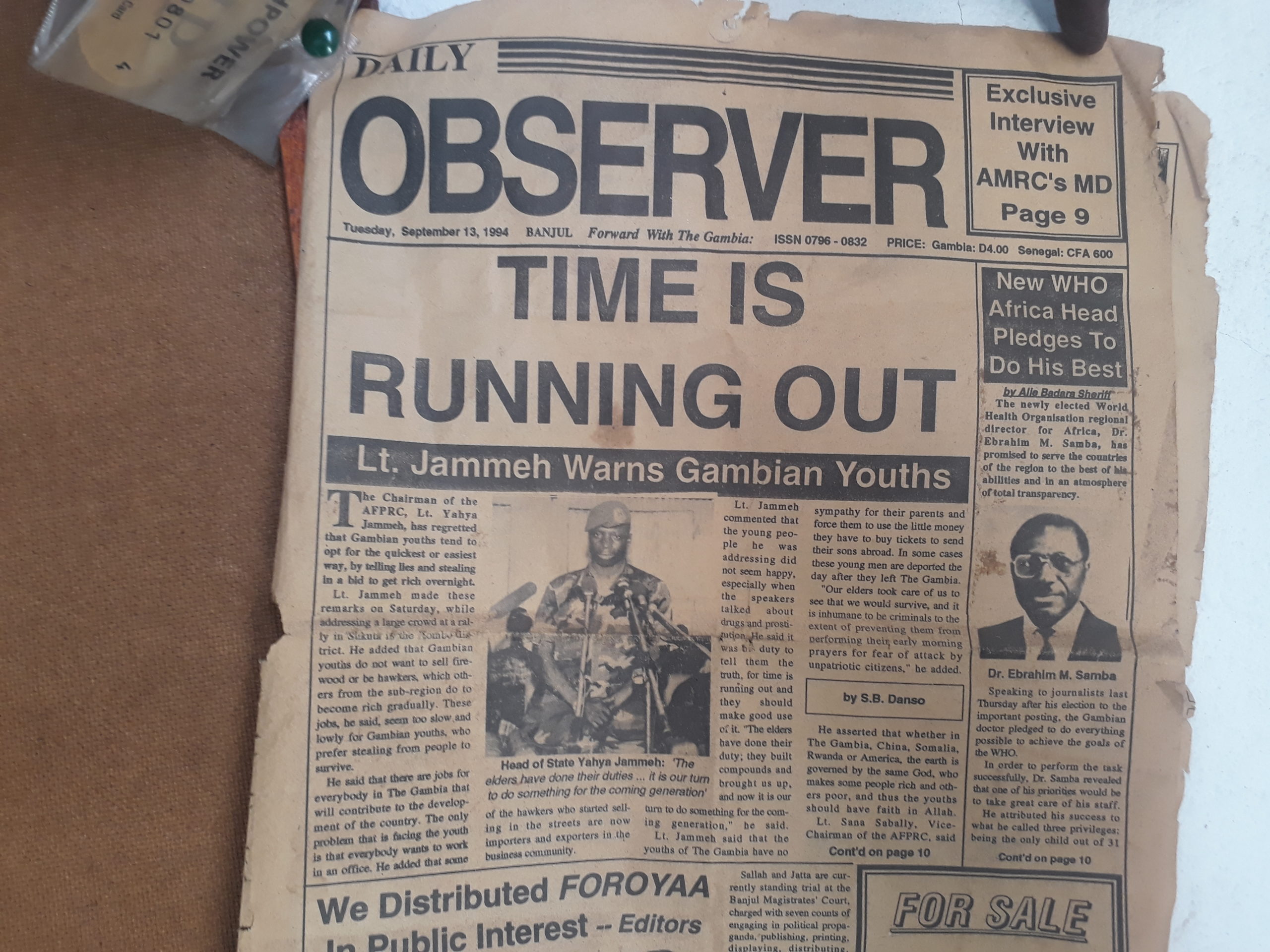
Hopes for justice fading
April 10 and 11 event cost Gambia 14 lives. Several others were injured, some life-threatening injuries. In every single case, justice remains a distant dream.
Elsewhere, Sira Barry lies on her bed side in a modest two-bedroom house in Brikama, about an hour drive from Banjul. At her parlor to the left was a bed and a chair to welcome her guests. She was lying on a mat. She was sick and could not talk to journalists.
Sira, fondly called Suba, is the only surviving member of the family of Ebrima Barry, a student allegedly beaten to death by members of the Gambia Fire and Rescue Services in 2000.
“In our family, we have not seen any investigation report, we have not heard of any arrest in connection to our brother’s death. And we have not had any compensation from the state,” says Alagie Barry, Ebrima’s half-brother.
Alagie and Ebrima shared a father. Their father, Alieu Barry has four wives. Alieu waited for justice for his son until his death in 2006. Ebrima’s mother, Boto Sanneh also succumbed to death two years after him in 2002.
Ebrima’s five other siblings from his mother followed him to the grave with promise of justice that would not come. “They all died after the death of Ebrima,” says Alagie.
Alagie however declined to make any further comment. He said their family deligated one of their half-brothers Mbemba Barry, a police officer, to speak on their behalf.
The student demonstration was a dark period in Gambia’s history. Like all of the country’s past under the former dictator Yahya Jammeh, it is also being visited at the Truth, Reconciliation and Reparations Commission.
So far, 7 victims have testified with promise of many more to appear, including perpetrators.

Shooting at unarmed students
When the student demonstration in Gambia began, the country’s former dictator Jammeh was in Cuba. His vice president who was in the country at the time, Dr Isatou Njie Saidy, claimed the protesters were carrying guns, justifying use of force.
“There is no doubt that the crisis was incited by the Gambia Students Union (Gamsu) and aggravated by some bad elements and bandits who took advantage of the situation, disguising themselves as students and encouraging the crowd of so-called demonstrators to the damage,” Government says in a statement.
The Commission heard testimonies of 59 witnesses from security forces, students, parents, ordinary people and school administrators, among others.
According to the Commission, a total of over 16 million worth of materials were destroyed during the protest.
Among the recommendations is the prosecution of 7 student leaders who called for the protest. Included in the list was the president of Gamsu Omar Joof and vice president Alhagi S. Darboe, among others.
“Top police authorities on the ground at Kanifing on the 10th April 2000 should accept responsibility for the tragedy that happened; namely secretary of state for the interior Ousman Badji, deputy inspector general of police Sankung Badgie, Commissioner of operations Baboucar Sowe and assistant superintendent of police Momodou Ceesay,” says the report.
“We recommend that the PIU personnel deployed on 10th April between GTTI and Westfield junction should assume responsibility for the deaths and injuries that occurred as a result of gunshots and face prosecution for their acts.”
Also indicted in the report is the current head of the country’s anti-crime division of the Gambian police, Gorgi Mboob and Captain Wassa Camara, a serving member of the Gambia Armed Forces.
The investigators said Mboob and his colleagues “carried an AK47 rifle and fired the guns at the direction of the students on the St. Augustine’s Senior Secondary School compound” and “should face appropriate charges”.
This report was thrown to carry dust. No one was prosecuted for the death or torture of the students. In April 2001, the National Assembly passed a law indemnifying people involved in quelling the protest. There was neither an acceptance of responsibility for loss of lives nor was there any compensation.
“People who shot us are still in the system and are being paid… It angers us that after changing the Government, there is still no justice. Perpetrators are free and enjoying and victims are crying. It is very unfair,” says Abdou Karim Jammeh.
Abdou Karim Jammeh was one of the students who were badly hurt during the protest. He was shot on his knee cap. Now he uses a walking stick.
In 2017, Karim Jammeh and his colleagues petitioned Justice Minister Abubacarr Tambadou demanding the implementation of the recommendations of the April 10 and 11 commission of inquiry. Abdou Karim says they have since not gotten any response from authorities.
“Without justice, the pain is still there…,” says Lamin’s father Bojang. “And the sad thing is that parents are dying without seeing justice for their children.” For now, the only thing Bojang got from the state were a D2500 condolence money from Jammeh and D5000 on the forty days charity for his son. This was to buy their silence. But Bojang’s story is one too many.

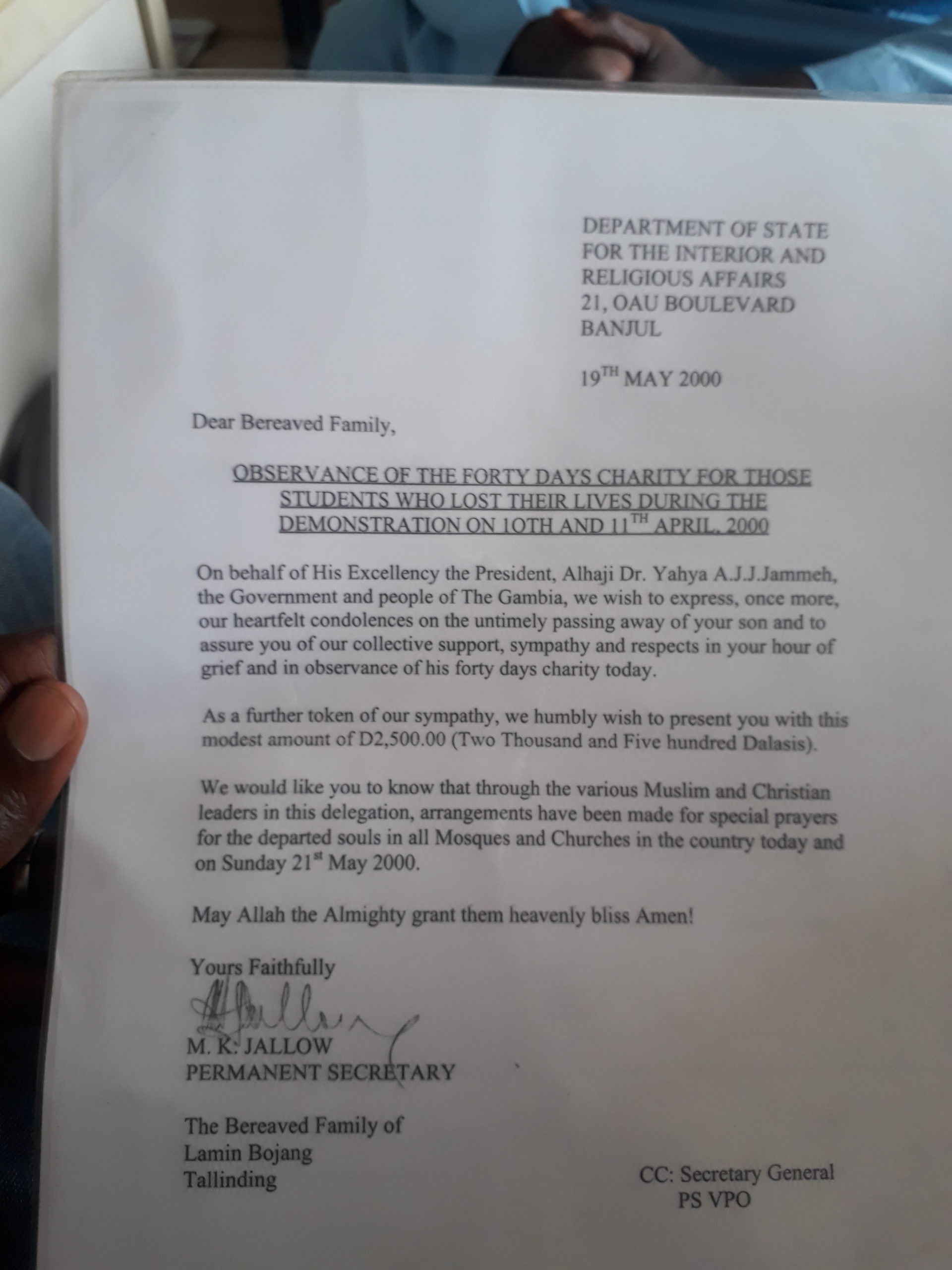
“President Barrow would not even meet victims,” says Abdou Karim.
Download the 10 and 11 report here…
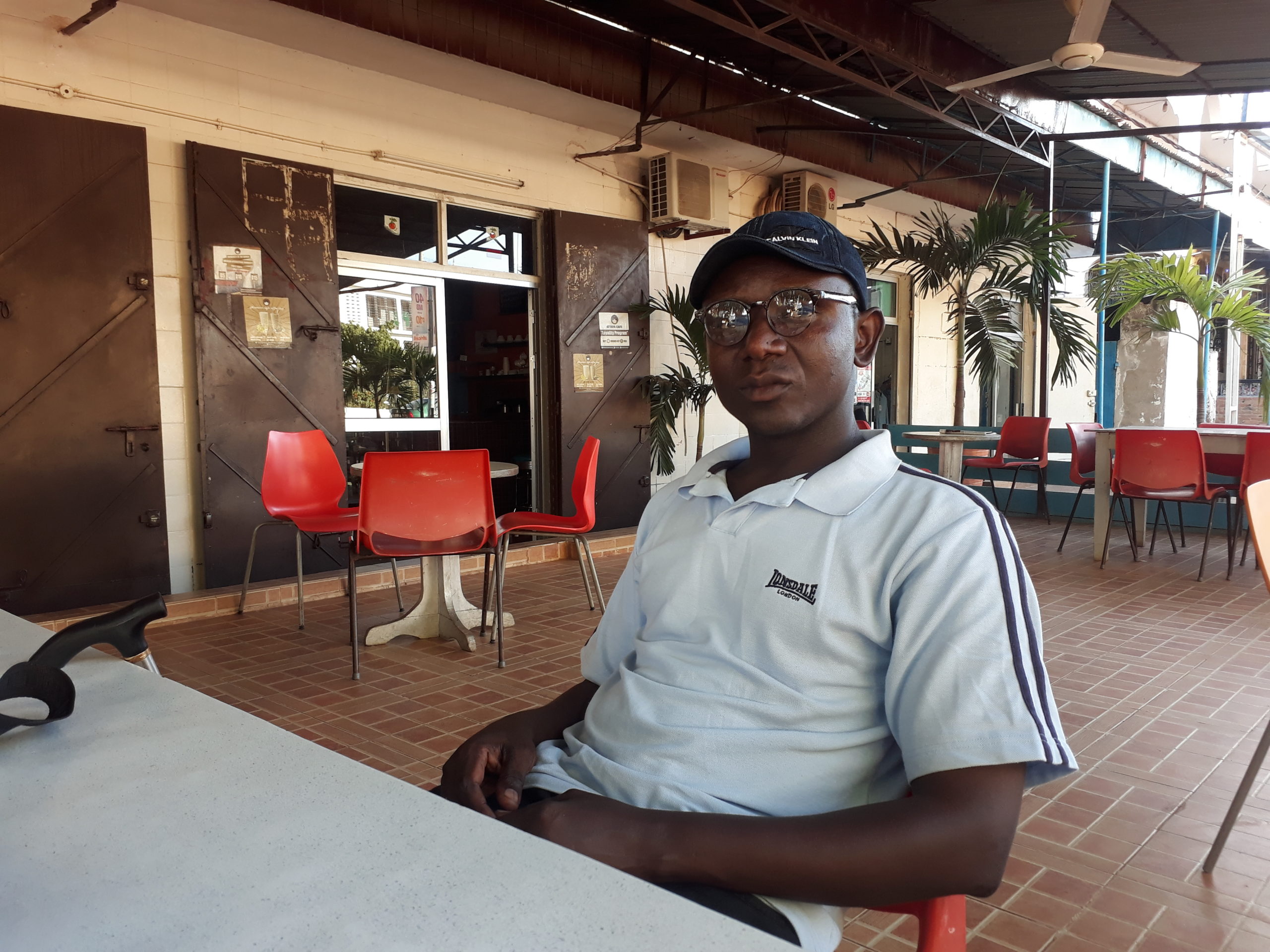
Medical treatment
Justice is not the only thing that evades the victims of the student protest. Some have had their lives changed by the event.
After the incident, Sainey Senghore, Assan Suwareh and Yusupha Mbaye were evacuated to Egypt for further treatment. Mbaye was shot and a bullet hit his spinal cord, confining him to a wheelchair. Senghore who later developed gangrene on his foot told the TRRC that only a month of their medical bill was paid by Government. Their Egyptian doctor had to volunteer to pay the other month.
They would later be returned but their medical problem continues. And at the airport, they confiscated their medical reports. Their explanation was that the case of the students is a political one.
The students, mainly Senghore, Yusupha, Jammeh and Oumie Jange who was shot at her elbow, have had to continue seeking further medical treatment to this day. In 2017, the Turkish embassy in Gambia had volunteered free visa and free treatment for the victims.
They were only required to buy their own air tickets at a tune of D55, 000 each. The Government claimed it had no money.
However, the Gambia Ports Authority pledged tickets for 3 of the victims. They were then required to find tickets for 2 others including their escort. Until today, they could not secure the extra two tickets.
“… We felt abandoned by this Government,” says Abdou Karim. Meanwhile, in 2019 the Truth Commission has established a medical board to review the health status of the victims. The Board again recommended for treatment abroad for the four but so far nothing comes out of that.
However, Ebou Faye Njie from the TRRC victim support unit tells Kerr Fatou they are working on a remedy to the victims’ health problems. It is not clear what solution they have and when.
“For 19 years, we have been crying for justice…,” says Senghore before the Commission. That cry continues. His dream of studying medicine, like all his other colleagues, remains a pipe dream.
For 20 years, their Government has failed them. The cry for justice and health continues. “The case of the students is unlike others,” says Bojang.
“It has already been investigated and all you need is implement the recommendation of the inquiry. That is taking forever and our hopes are now fading.”


Comments are closed.